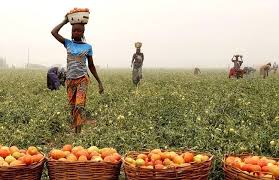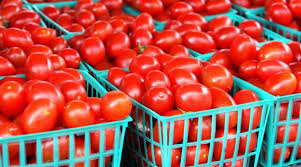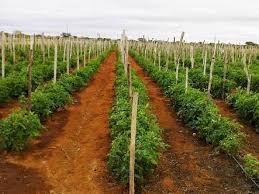![]()
If you’ve landed on this article page, you’re probably searching for a
good business idea—an idea that’s light on the pocket but heavy on
returns, promising both a fulfilling journey and potential profit.
|
How
to start Tomato Farming in Nigeria
Tomato farming is very simple. Anyone can do it in any capacity,
either in the backyard or in commercial quantity. Tomato farming
was mostly practiced in the northern part of Nigeria before. But
now people can cultivate it in the southern parts too.
In Nigeria, tomato farming is predominantly done in the northern
part of the country. Most states in the north like Kano, Jigawa,
Plateau, Benue, Kaduna, Gombe, Bauchi, Sokoto, Kebbi, Nasarawa,
Zamfara and Kogi have huge tomato plantations.
It is a fact that over 80% of tomato farmers in Nigeria still
cultivate tomatoes in the old and outdated ways. This has made
the average yield of tomatoes in Nigeria to be about 2 tonnes.
The tomato is consumed in diverse ways, including raw, as an
ingredient in many dishes and sauces, and in drinks. While it is
botanically a fruit, it is considered a vegetable for culinary
purposes. The fruit is rich in lycopene which may have
beneficial health effects.
In Nigeria, tomatoes are not officially exported; however, there
are exports of fresh tomatoes to neighboring countries. Traders
in the Republic of Benin, Cameroun and Chad etc. come to buy
fresh tomatoes in Nigeria.
In Badagry, Lagos, a lot of traders from the Republic of Benin
buy fresh tomatoes from Nigeria and ferry to their country,
ditto, in the border towns of Northern Nigeria.
Planting
Tomato grows well in loamy soil and thrives better in a soil
with an acidic pH. It’s best grown during the dry season as they
do not really require a lot of rainfall for germination. Keep
down weeds initially by cultivating lightly being careful not to
damage roots. Water with an inch or so of water every week if
there has been no rain and even if there has, wind conditions
can dry a bed quickly so check the soil a few inches down to
make sure it is still moist. A deep mulch after the plants are
established will keep weeds at bay and retain moisture in the
soil. Prune lower branches from suckers but leave some suckers
on upper branches to protect fruits from the sun. Compost is
usually applied on the plant after they flower.
Tomatoes have many advantages over growing other types of crops,
such as:
• Their high yield which results in their high economic value.
• They have very high nutritional value with high levels of
pro-vitamin A and C. As well as being ranked first on their
nutritional contribution to a human’s diet.
• They are a short duration crop.
• They are very well suited for different cropping systems that
are used on grains and legumes[iv]
Tomato Farming Business Plan
FARM SET-UP FOR A ONE HECTARE TOMATO FARM
Cost of Drip Irrigation
625,000.00
Installation of Drip Irrigation System
On Site Training of staff in precision farming
Soil and Water Analysis
625,000.00
Fertilisers:
NPK (15 bags)
90,000.00
Potassium Nitrate (5 bags)
75,000.00
Camag (3 bags)
30,000.00
Potassium Humate
5,000.00
200,000.00
Pesticides:
Insecticides (15 bottles)
30,000.00
Fungicides
30,000.00
Nematicides
10,000.00
60,000.00
PROFIT ANALYSIS FOR A ONE HECTARE TOMATO FARM- SCENERIO 1
Revenue:
500 big baskets @ N15,000
7,500,000.00
Cost:
Rent of one hectare of farmland
25,000.00
Fertiliser
200,000.00
Manure
50,000.00
Pesticides
70,000.00
Hybrid Seeds
120,000.00
Labour for 6 months
240,000.00
Knapsack Sprayer
5,000.00
Farm Tools
10,000.00
720,000.00
Profit
6,780,000.00
PROFIT ANALYSIS FOR A ONE HECTARE TOMATO FARM - SCENERIO 2
Revenue:
500 big baskets @ N10,000
5,000,000.00
Cost:
Rent of one hectare of farmland
25,000.00
Fertiliser
200,000.00
Manure
50,000.00
Pesticides
70,000.00
Hybrid Seeds
120,000.00
Labour for 6 months
240,000.00
Knapsack Sprayer
5,000.00
Farm Tools
10,000.00
720,000.00
Profit
4,280,000.00
PROFIT ANALYSIS FOR A ONE HECTARE TOMATO FARM - SCENERIO 3
Revenue:
500 big baskets @ N4,000
2,000,000.00
Cost:
Rent of one hectare of farmland
25,000.00
Fertiliser
200,000.00
Manure
50,000.00
Pesticides
70,000.00
Hybrid Seeds
120,000.00
Labour for 6 months
240,000.00
Knapsack Sprayer
5,000.00
Farm Tools
10,000.00
720,000.00
Profit
1,280,000.00
Notes/Assumptions
The profit analyses above were done using three scenarios (best
case, mid case and worst case).
Sales Revenue: There is always a peak and off peak time in the
price cycle of tomatoes in Nigeria.
The price of tomato at some certain months in Nigeria can
spike by as much as 300 – 500%.
The spike in tomato prices occurs every year in Nigeria. The
peak season of prices of tomato in Nigeria is usually April –
July (wet season). During this time, the price of a 50-60kg
basket of tomatoes can go as high as N20,000 – N30,000.
During the low price time of September – February, the price of
a 50-60kg basket of fresh tomatoes can go as low as N5,000.
It is assumed in this computation that a tomato farmer will
harvest up to 500 baskets of tomatoes every year. This comes
down to about 25 tonnes per hectare.
Please note that you can harvest up to 50-60 tonnes per hectare
if you implement sound agronomic practices.
Tomato farming is a profitable agricultural business in Nigeria
. It is an important source of income and food for millions of
people in the region. With the right skills, resources, and
market opportunities, tomato farming can be a sustainable and
lucrative venture. However, tomato farming faces various
challenges in the region, including pests and diseases, market
fluctuations, and climate change. Despite these challenges,
tomato farmers can adopt innovative strategies such as
greenhouse farming, irrigation, and post-harvest processing to
mitigate risks and improve their yields. In addition, tomato
farming presents several business opportunities, including
tomato paste production, exporting, and retailing. Get our Practical Guide on How to start Tomato Farming business in Nigeria. This comprehensive guide will walk you through the fundamentals of starting and running a successful Tomato Farming Business in Nigeria, from initial planning to profitability. We’ll cover key factors like identifying in-demand niches, establishing a strong brand, marketing effectively, optimizing operations and delivering an exceptional student experience.
|







